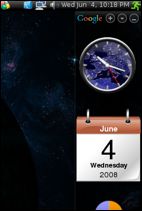Thursday, June 5, 2008
Google Gadgets for Linux: One Step closer to Open Source
By Yannick Stucki

Google has always been a friend of open source. First, when they were “only” a search engine as a user with their Linux based servers or their GIMP drawn Google logo, but later also as a contributor. Nowadays, the involvement is too broad to be fully covered here, but to mention a few they submitted countless fixes to WINE, have the Google Summer of Code program, an open source project hosting page and last not least full projects that were or are yet to be open sourced like Google Web Toolkit or Android.
Recently, Google took another step towards open source: Google Gadgets for Linux. Google Gadgets come in two flavors; the ones that are desktop based and the ones that are website (iGoogle) based. For desktop gadgets one needed Google Desktop for Windows or later also for the Mac, a free but closed software. Now the user can also install the gadgets on Linux, however, there is a big difference in how the project has been approached. Google Gadgets for Linux is open sourced under the Apache License 2.0. This is nothing new for Google, as they have many open source projects, but this time they started being fully open from the first day on. They are already encouraging users to become contributors and on the project homepage there is an outlook on what is planned like a KDE4 Plasma integration, a FreeBSD and Solaris port and a developer documentation.
It’s interesting to see Google shifting more and more into the open source space and despite already having open projects, this is maybe Google’s “most open” so far. Jim Zhuang phrased it fittingly on the Google Open Source Blog:
For Gadgets for Linux, we don’t just want to simply release the final offering, but we also want to give everyone a chance to tinker with the code powering the gadgets. For this project, fostering a transparent and lively developer community is just as important as serving our users.
You can run the gadgets using either GTK or QT, but you still have to compile the project from scratch. As Jim said it hasn’t reached 1.0 yet and there are a few things to be polished, but it’s already stable and can run a lot of gadgets with full features. However, the stage of the project won’t be a problem for the Linux users out there, since they are used to compile themselves and dive into a project which is still in development.
>> More posts
Advertisement
This site unofficially covers Google™ and more with some rights reserved. Join our forum!
